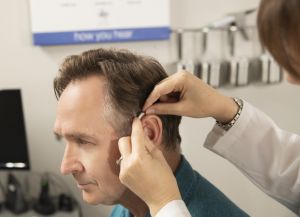|
www.HealthyHearing.com |
How long do hearing aids last?Hearing aid lifespan depends on several key factors
Contributed by Susanne Jones, BC-HIS, customer support manager, Healthy Hearing When deciding on a new pair of hearing aids, you should consider how long they will last. Just like buying a car, the actual mileage may vary. Average hearing aid lifespanMost modern high-quality hearing aids have a life expectancy on average between three and seven years. However, keep in mind that two people can buy exactly the same brand of hearing aids and have them last different amounts of time. Here's why: Nine things that affect how long hearing aids lastThere are at least nine factors that impact the average lifespan of a hearing aid:
1. Materials used to make hearing aidsAlthough they are designed to be durable, hearing aids are made of plastic, metal, silicon, polymers and other materials that can degrade with time. Most hearing aids sold today have a protective coating to resist water, dust and moisture, but you should still treat them gently to protect them from shock and impacts. 2. Frequency of cleaning (at home and professionally)Earwax, moisture, dust, skin oils, sweat, extreme temperatures and sunlight all affect hearing aid longevity. To help extend your hearing aids' life expectancy, clean them daily as directed by your hearing care practitioner and have them professionally cleaned in the hearing clinic every three to four months. 
five years, but this depends on a lot of different factors. 3. Where hearing aids are wornHearing aids that are consistently in damp or dusty environments often have more performance issues than other hearing aids. If you’re concerned about the environments in which you wear your hearing aids, consult your hearing care professional for ideas about protective measures. You may need to use protective sleeves or schedule more frequent professional cleanings to extend the life of your hearing aids. 4. Battery styleFor rechargeable hearing aids, lithium batteries last about four to five years. Just like with smartphones, the battery lifespan gets shorter the longer you own the device. If you notice your battery draining faster than usual, speak to your hearing care provider about whether new rechargeable batteries will help, or if you should get new devices. Hearing aids with disposable batteries may not experience this, but you still need to take care of them. A storage case with a dehumidifier will keep them dry, which will also help them last longer. Ask your hearing care practitioner what type of storage case or dehumidifier options would work best for your hearing aids. 5. Style of hearing aidsConventional wisdom in the hearing aid industry is that behind-the-ear (BTE) styles tend to have a longer lifespan than in-the-ear (ITE) styles. The reason behind this wisdom is more of the electronic components sit in the damp environment of the ear canal with ITE styles. However, recent technical advancements in nanocoatings on internal and external components may soon make this durability difference a thing of the past. 6. Your body’s physiologySome people have very oily skin, produce a lot of earwax or sweat profusely–all of these factors can impact hearing aid life, too. You can’t control these things, of course, but if you have any of these issues you should discuss them with your hearing care practitioner when you’re selecting hearing aids. 7. Frequency of maintenanceMost hearing aids have some readily-replaceable parts, such as wax guards, earmold tubing and silicone dome earpiece tips. These parts are regularly replaced during routine maintenance visits with your hearing care practitioner. There are other parts which can usually be replaced or repaired in the clinic if they become damaged or nonfunctional, like battery doors, earmolds, external speakers and microphone covers. These types of maintenance activities are very important for making your hearing aids last as long as possible. 8. Technological advancements
Many new hearing aids can connect to phones via Bluetooth, for example. Obsolescence can become an issue for old hearing aids. After several years (usually between five and 10), hearing aid manufacturers may stop making replacement parts for a particular aid, which may make repairs on old hearing aids difficult or impossible. Software used to program hearing aids can become obsolete. This often makes it difficult to reprogram older hearing aids. The technology in the most advanced hearing aids available six or seven years ago would be considered basic today. While some folks are content to stick with what they have if it still performs for them, many people who buy hearing aids find themselves wanting to benefit from the new technology that becomes available four or five years down the road. 9. Changing needsEverything described up to this point focuses on the hearings aids themselves. Changing needs of the wearer can also affect how long hearing aids last. Sometimes after several years, a person's hearing loss can progress to the point where a more powerful hearing aid would suit them better, or a cochlear implant. If a person develops tinnitus, they may want a hearing aid with tinnitus masking. More: What to do with old hearing aids Need help?Find a consumer-reviewed hearing care provider near youIf you're considering new hearing aids, or need help with your current pair, a qualified audiologist or hearing instrument specialist can make all the difference. Find a clinic near you. Susanne Jones, BC-HIS, customer support manager, Healthy Hearing
|
Featured clinics near me
Earzlink Hearing Care - Reynoldsburg
7668 Slate Ridge Blvd
Reynoldsburg, OH 43068

Find a clinic
Need a hearing test but not sure which clinic to choose?
Call 1-877-872-7165 for help setting up a hearing test appointment.


 Susanne Jones holds a bachelor’s degree in communications from Bradley University and is board certified in hearing instrument sciences. Susanne enjoys helping hearing care practitioners across the country provide quality care to people with hearing loss.
Susanne Jones holds a bachelor’s degree in communications from Bradley University and is board certified in hearing instrument sciences. Susanne enjoys helping hearing care practitioners across the country provide quality care to people with hearing loss.